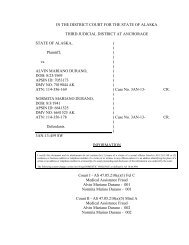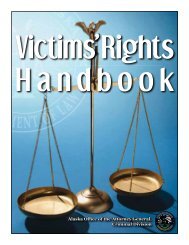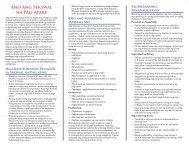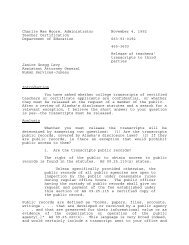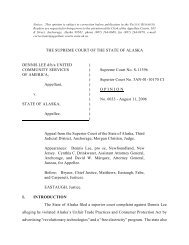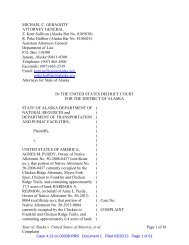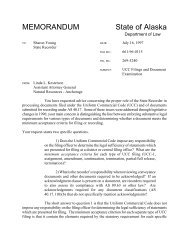Initial Report and Recommendations - Alaska Department of Law
Initial Report and Recommendations - Alaska Department of Law
Initial Report and Recommendations - Alaska Department of Law
- No tags were found...
Create successful ePaper yourself
Turn your PDF publications into a flip-book with our unique Google optimized e-Paper software.
For many years, <strong>Alaska</strong> had a State Revenue Sharing (SRS) program that helpedfund municipal governments. The SRS program no longer exists <strong>and</strong> its demise hasmade it more difficult for municipal governments in rural <strong>Alaska</strong> to survive.Further exacerbating the problem <strong>of</strong> providing sufficient governmental services inrural <strong>Alaska</strong> is the continuing failure <strong>of</strong> inter-governmental cooperation, particularly – inmany small villages – between municipal <strong>and</strong> tribal governments. As mentioned in thenext section <strong>of</strong> this report, there are a few examples <strong>of</strong> highly successful, cooperativearrangements between tribal <strong>and</strong> municipal governments, but they do not represent thenorm. These examples <strong>of</strong> successful cooperation do illustrate, however, that this is oneobstacle to improved rural services that can be overcome.C. Successful ApproachesProgress is possible, however, <strong>and</strong> there are a number <strong>of</strong> law enforcement, justice,<strong>and</strong> treatment programs that work well today <strong>and</strong> <strong>of</strong>fer successful strategies that could beadapted elsewhere.An example <strong>of</strong> a successful law enforcement arrangement can be found inQuinhagak, a small village on the Kanektok River east <strong>of</strong> Kuskokwim Bay, less than amile from the Bering Sea Coast. The total population is around 612, <strong>and</strong> 97 percent <strong>of</strong>the residents are Native, almost exclusively Yup’ik. Under <strong>Alaska</strong>’s local option law,Quinhagak voted “dry,” banning all sale, importation, <strong>and</strong> possession <strong>of</strong> alcohol. Underan agreement between the second class city government <strong>of</strong> Quinhagak <strong>and</strong> the tribalgovernment <strong>of</strong> the Native Village <strong>of</strong> Kwinhagak, the maintenance <strong>and</strong> operation <strong>of</strong> allcity services were transferred to the tribal government, <strong>and</strong> the IRA council <strong>and</strong> cityadministration were merged into one. As part <strong>of</strong> this agreement, a joint law enforcementauthority was established, which is administered by the tribal government, <strong>and</strong> lawenforcement applies equally to tribal members <strong>of</strong> the Native Village <strong>of</strong> Kwinhagak <strong>and</strong>non-Native residents <strong>of</strong> the second class city <strong>of</strong> Quinhagak. The Kwinhagak/QuinhagakMemor<strong>and</strong>um <strong>of</strong> Agreement was reviewed by several <strong>of</strong> the Commission’s workgroups,<strong>and</strong> the Commission <strong>of</strong>fers it as a model that other rural <strong>Alaska</strong> villages could follow. 42Kake, located on Kuprean<strong>of</strong> Isl<strong>and</strong> in Southeast <strong>Alaska</strong>, has developed <strong>and</strong>refined a highly successful restorative justice system, initiated by Mike Jackson, the StateMagistrate in Kake. The population <strong>of</strong> Kake is about 665, <strong>of</strong> whom 75 percent areNative, predominantly Tlingit, <strong>and</strong> its governments include both that <strong>of</strong> a city <strong>and</strong> afederally recognized tribe, the Organized Village <strong>of</strong> Kake (OVK). Having suffered manyproblems with the community’s youth for many years, including alcohol abuse <strong>and</strong> a highsuicide rate, the community in 1999 organized the Healing Heart Council <strong>and</strong> CirclePeacemaking, both <strong>of</strong> which are embedded in Tlingit tradition but, at the same time,closely coordinated with the <strong>Alaska</strong> Court System.Quoting from Harvard University’s John F. Kennedy School <strong>of</strong> Government,which awarded the Organized Village <strong>of</strong> Kake its “High Honors” in 2003:42A copy <strong>of</strong> the Quinhagak MOA is on the Commission’s website.<strong>Alaska</strong> Rural Justice <strong>and</strong> <strong>Law</strong> Enforcement Commission - Page 26




